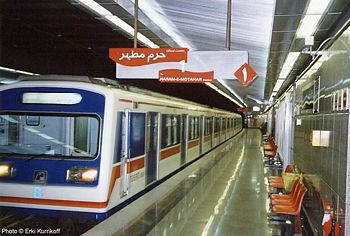Monday 15 October 2012 - 20:36
Story Code : 7823
Iran seeking China funding to complete metro project
Oct 15 (Reuters) - Iran is hopeful its ally�China�will fund up to $2 billion to complete Tehran's metro rail which faces delays due to lack of financing as a result of sanctions, a government official said on Monday.
Phase two of the metro is on track for completion next year but two new lines under the third phase may be delayed due to lack of money, Mohammad Montazeri, deputy managing director, planning & logistics, Tehran Urban & Suburban Railway Co said.
"We are seeing funds from foreign companies. We are in negotiations with China (government, banks and agencies), we are hoping to get financing," he told Reuters on the sidelines of the Middle East Economic Digest's Rail Projects conference.
"If the loans come we can finish on time," he said.
The United States and its allies accuse�Iran�of using its atomic programme as a cover to develop nuclear weapons and have imposed increasingly stringent economic sanctions to try to force Iran to answer questions about the program. Iran has said its program is for solely peaceful purposes, not for weapons.
Tehran initially planned to build 430 kilometres of metro lines with 256 stations at a cost of $18 billion. But as sanctions began to bite, only 261 kilometres and 175 stations were approved, estimated to cost around $10 billion, he told the conference earlier.
The 89-km, 41 stations phase one is operational and the 70-km, 66 stations phase two is scheduled for completion in 2013. The third phase of two lines, about 102 km and 68 stations is due to be completed by 2015, if financing is secured.
By the end of this year, five lines covering 147 km and 88 stations will be operational, he said.
Foreign loans which accounted for 43 percent of the approximately $10 billion (for all three phases) metro cost from 1987 to 1997 fell to 10 percent during 1997 to 2005. At the end of last year, foreign loans dried up completely, he said.
"Now, 50 percent of the funding is from the private sector and the rest from the government," Montazeri said.
The impact of sanctions is less severe on equipment as 80 percent of Iran's requirements such as wagons, machinery and other products are produced locally.
"Only for about 20 percent we may feel the impact but that is not economically viable for us to produce in Iran," he said, adding some goods such as rail tracks are imported from China, without giving details.
Despite sanctions, Iran has managed to import banned goods from some countries in return for oil shipments.
"Foreign investment is the main problem," he said, adding the company receives over 70 percent subsidy from the government.
With a population of 8 million in Tehran, at least 15 million journeys are made on the metro daily, he said.
The Iran Project is not responsible for the content of quoted articles.
# Tags











